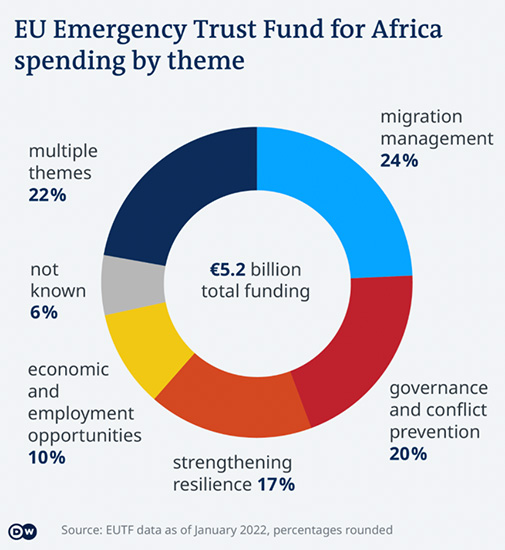
The EU’s €5 billion fund to stop irregular migration from Africa has failed to achieve its goal, said the European Court of Auditors in a September 25 report, ‘Brussels Signal’ reports. No achievements, no money…
It added the European Commission had failed to monitor whether EU funds had in fact contributed to severe human rights breaches.
The EU created the Emergency Trust Fund for Africa (EUTF) in 2015, to “address the root causes of instability, forced displacement and irregular migration” and “contribute to better migration management”.
But even after nine years, and spending the majority of its €5 billion in funding, the trust fund had “still not properly focused on priorities”.
Because of a “post-2015 panic to limit the number of new arrivals”, the EUTF “encouraged the rapid disbursement of EU funding without adequate monitoring of its effectiveness and impact,” Jeff Crisp, a research fellow at the University of Oxford’s refugee studies centre, told Brussels Signal.
African institutions receiving EU funding under the programme have included security forces and militia groups in Libya, where two rival administrations fight for control.
“The EU is failing in its basic task of ensuring that taxpayers’ money directed for migration management is not used to facilitate torture and other, sometimes deadly, abuses by unaccountable security forces,” Olivia Sundberg Diez, Amnesty International’s EU advocate on migration and asylum told Brussels Signal.
The Court of Auditors’ report “should ring alarm bells across EU capitals and the European Commission leadership,” and “confirms what we, development organisations, parliamentarians and watchdogs have been saying for a while,” she said.
The trust fund used its €5 billion in funding to address “a too wide range of development, humanitarian and security actions, not all of which were the most urgent,” said Bettina Jakobsen, the auditor chiefly responsible for the report.
The auditors also found examples of funded projects which had simply been abandoned. One was an EU-funded solar-power chicken shed, able to fit 1,000 birds, coupled with a slaughter house. It had laid empty after the youth association running it decided it was not viable.
Of 115 EU-backed businesses or infrastructure and equipment investments, 33 were no longer operational, while 66 were at risk of closing down.
In that “Special report 17/2024: The EU trust fund for Africa – Despite new approaches, support remained unfocused” the European Court of Auditors stated in particular:
“In October 2015, the European Commission established the European Union Emergency Trust Fund (EUTF) for stability and addressing root causes of irregular migration and displaced people in Africa.
The EUTF focuses on the crisis situation in three African regions: the Sahel and Lake Chad, the Horn of Africa, and the North of Africa.
As of the end of 2023, the EUTF had paid out €4 508 million of its €5 billion endowment.
We also examined whether the EUTF has focused support on achieving its aims while showing due concern for human rights. We found that support remained insufficiently focused by addressing a too wide range of development, humanitarian and security actions.
All of the projects we examined responded to needs, but not always those that were most urgent.
The volatile environment in which the EUTF operates poses challenges to project monitoring.
In addition, there is still insufficient data to establish whether projects have helped to address the root causes of instability, irregular migration and displacements.”
read more in our Telegram-channel https://t.me/The_International_Affairs

 12:29 18.10.2024 •
12:29 18.10.2024 •






















